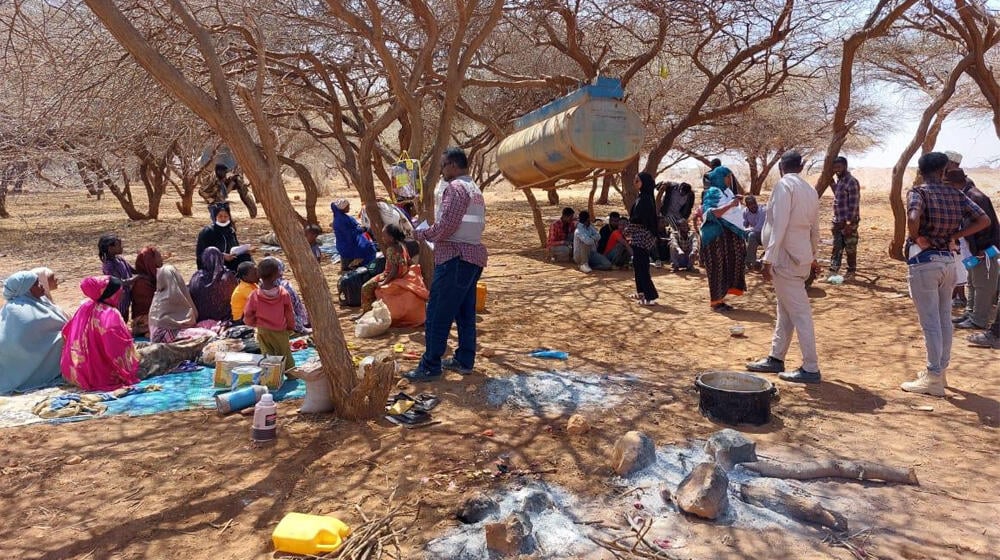The escalating conflict in Las'anod is yet another crisis facing Somalia, a country already grappling with a severe drought and ongoing security challenges. Las’anod city is currently in the midst of a deadly conflict that has resulted in over 170 people being killed and over 500 injured in Las-anod thus far. This includes seven children and their mother. However, the actual casualties and the impact on the civilian population cannot be confirmed so far. More than 50 schools have been closed, affecting the education of over 15,000 children, and an estimated 185,282 individuals have been displaced, as per the interagency assessment report published on February 13th, 2023. According to media reports, residents are in danger of being hit by mortar fire and bullets as the situation remains volatile, and fighting may occur at any moment.
The displaced population has been forced to move to nearby towns, villages, and regions. The region was already affected by the ongoing drought, and the conflict has exacerbated the vulnerabilities of the most affected groups, including women, children, and the elderly. The newly displaced families do not have access to adequate housing, with the majority co-habiting with relatives and host communities, while some are staying in rented places. High shortages of medical materials and drugs have also been reported in hospitals in Puntland, and there is a need for urgent medical supplies. Due to the increased movement of families, the protection risks for children, and incidents of family separation also remain high.
Women and girls have faced the most severe protection concerns during the conflict due to the loss of shelter, essential food, and non-food items. The situation is compounded by the prolonged drought, leaving them at heightened risk of malnutrition, disease outbreaks, and hunger due to difficulties in accessing essential life-saving services such as adequate and safe shelters, latrines, and essential food and non-food items.
UNFPA Somalia has been responding to the Las’anod emergency since the crisis began on December 26th, 2022, by providing urgent medical assistance not only to women of reproductive age, pregnant and lactating women but also to injured civilians. UNFPA-supported medical personnel are working around the clock to save lives. UNFPA Somalia sub-offices in Puntland and Somaliland are supporting 11 Emergency Obstetric and Newborn Care (EmONC) facilities that are providing services to the conflict-affected individuals, with eight of those facilities located in the Sool region, namely Falayeryaal, Awrbogays, and Saah-Dheer, Las’anod, Xalin, Las’anod and Hudun, and the rest of the facilities located in Garowe. All of these facilities are working tirelessly to serve the women, girls, and children affected by the conflict.
As part of its immediate response to the crisis, UNFPA will distribute 3,000 dignity kits and 2,000 menstrual hygiene kits in the coming week. These kits contain hygiene and sanitary items, as well as other items explicitly tailored towards the local needs of women and girls of reproductive age.
The interagency assessment report shows that the displaced populations have moved to various villages and towns and are scattered in small villages with no health services. To respond to the increased need for maternal health services, UNFPA plans to deploy integrated outreach mobile services to serve women of reproductive age. The outreach campaign will ensure that women and girls receive life-saving reproductive health services, including basic emergency obstetric care services, and referral for comprehensive emergency obstetric and neonatal services, as well as life-saving GBV services of medical, psychosocial support, and referrals in line with UNFPA's humanitarian operation plan and Humanitarian response plan.
Mobile health clinics are one of the best ways to reach women and girls who face extreme barriers to accessing life-saving healthcare. By taking the burden off women and girls to travel long and often dangerous distances and by providing them with free maternal health services, UNFPA goes the last mile for every last woman in need of reproductive healthcare.
However, to continue providing these critical services, UNFPA urgently requires an additional $1.5 million USD. This funding is essential to provide urgent life-saving services for maternal health and GBV services to the most vulnerable women and girls in Somalia.
UNFPA urges the international and donor community to join us in this urgent response to this crisis, to protect and safeguard the lives of women and girls in Somalia. Together, we can ensure that they receive the necessary medical assistance, essential items, and reproductive health services they require to survive this crisis.



